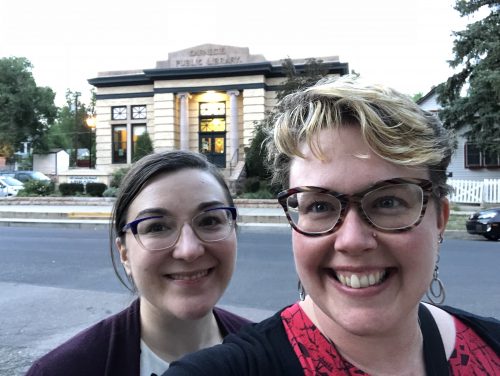This article is more than 5 years old.
Between May 8th and June 7th, I traveled three times for work: my annual intellectual property officers conference, a library leadership workshop, and a copyright conference. My trusty little suitcase, bright yellow backpack, and I traveled to The Ohio State University, Yale University, and University of Colorado Colorado Springs. Rather than write three separate blog posts, I wrote one long combined one.
TL;DR: Copyright rocks! Leadership rocks! Copyright still rocks!
University Intellectual Property Officers Annual Meeting, The Ohio State University

Our merry band of copyright nerds gathered for two full days of updates on case law, legislation, international treaties, and campus concerns. Inevitably, our conversations always expand into related issues, such as open access, publisher costs, big deals, ILL, etc. While copyright rocks, this past year has not been positive for copyright, either in court rulings – fair use has taken some knocks, or in Congress – the Music Modernization Act makes copyright in pre-1972 sound recordings more frustrating, rather than less. Here are highlights from our conversations that struck a chord:
- It’s time to eliminate double-dipping hybrid APCs (article processing charges) for open access to single articles in subscription-based journals
- If institutions are leaving big deals but ILL #s aren’t going up, where are faculty getting articles?
- Likely will need more money to free ourselves from unsustainable vendor contracts
- At some point, we either need to stop saying that the serials subscription environment is unsustainable OR we need to stop giving vendors our $; in doing both, we’re being disingenuous/crying wolf
- Meg Oakley’s investigation into CONTU guidelines found that the “rule of 5” was tied to the cost of borrowing vs. subscribing back in the 1970’s, so arguments to stick to CONTU in 2018 are hard to justify in light of this (and several institutions, Georgetown included, are moving away from CONTU for ILL)
- Looks like the United States will soon ratify the Marrakesh Treaty!
- Wrap together publishing practices conversation with predatory publisher conversation: there are some practices by “reputable” publishers that are quite predatory in practice!
- IRs are repos of last resort because they are silos
- Requiring students to engage with for profit platforms (e.g., Netflix for streaming content) has ethical considerations
- Watch for streaming license language specifying owned server – won’t work with AWS(?)
ARL Library Management Skills Institute I: The Manager, Yale University

The three day leadership institute I attended at Yale is among the most beneficial professional development opportunities I’ve ever had – big thanks to Tim and Susan for supporting my participation! Having dedicated time to immerse myself in leadership theories and best practices was refreshing and enlightening, and while I am still digesting all that I learned, I have already put some skills into practice. Key takeaways include:
- Power is not negative; can be a positive force for change
- My role is to listen and to ask questions
- People own that which they create: sometimes you need to slow down decision making to build consensus
- Learning is risk taking: nothing is perfect right out of the gate
- We typically judge others by actions but judge ourselves by intention
- Management is not just about what you’re good at, but also about what people expect of you
- Don’t ask “what didn’t work?” – rather, ask “what can we change?”
- Manager’s real job is managing people [should be obvious but often isn’t]
- Different people need info delivered in different ways: think about whether you need to give the what, who, how, or why
- Creativity lives in divergence: stay here longer for creative breakthrough; don’t move too quickly from idea generation to proposal building
- Feedback has to be actionable, addressing behavior that can be changed; must also be timely, specific, focused, non-evaluative, purposeful, and future-oriented
- I must seek feedback on my blind spot, recognizing that there is a gap in my perception of self versus others’ perceptions of me
Kraemer Copyright Conference, University of Colorado Colorado Springs

This was my second year attending the Kraemer Copyright Conference, and its sixth year in all. It is the only professional development opportunity I attended this year where I presented, with Melanie Kowalski from Emory University on Mix and Match the Copyright Code. At Kraemer, I had the opportunity to not only learn about copyright, but also to bolster my knowledge of privacy law and trademark law, two areas that I knew a bit about but welcomed knowing more. The theme for this year’s conference was exceptions to copyright, and most of my takeaways relate to the theme (or to trademark, because trademark is cool):
- Exceptions in law are reminders that there are strong arguments around these issues
- Exceptions tell us who showed up and who has power
- Apply exceptions before fair use then use fair use if you still need to
- Monkey selfie case [yes we’re still talking about it!] raises issue of non-human authorship but doesn’t solve it: animals can’t own copyright but what about A.I.-created works?
- Depending on where we stand, we are all on all sides of copyright at different times
- Always an IF, BUT, OR, UNLESS when discussing copyright
- Copyright policies are opportunities to show respect for colleagues and research
- Sometimes too much detail can get you into trouble – can define too narrowly and regret it!
- CONTU is not law! It is meant to supplement 108
- Trademark comes into existence not at creation but at use
- More unique, fanciful, or arbitrary mark is to good/service, the stronger the mark (e.g., Shell or Exxon to gasoline; Apple to computers; Xerox to copiers)
- Web domains can function as trademarks
- Single book titles cannot be copyrighted or trademarked, but series titles can be trademarked
All three gatherings were engaging and stimulating, but gosh was I happy to put my suitcase away for awhile after my final return!

7 Comments on ‘Molly at UIPO, LMSI, and Kraemer (all in a month!)’
Wow, what a productive 30 days for you!
Quite a whirlwind! Glad it was fruitful and that you were able to both learn and teach.
This all sounds intriguing – lots of food for thought!
Molly, thanks for this post. I think I got something new from each bullet point list! Super-efficient and effective!
Yes! on the CONTU guidelines not being law. So often we see those cited as if they were. Also, the Classroom Guidelines (1976) where we get the 10% maximum for fair use myth. It’s certainly time to rethink those guidelines. Sounds like the IP and Copyright conferences were great opportunities to facilitate those conversations.
In-for-ma-tive. That was a Molly full. Thanks for sharing.
what a busy, and interesting, month you had!